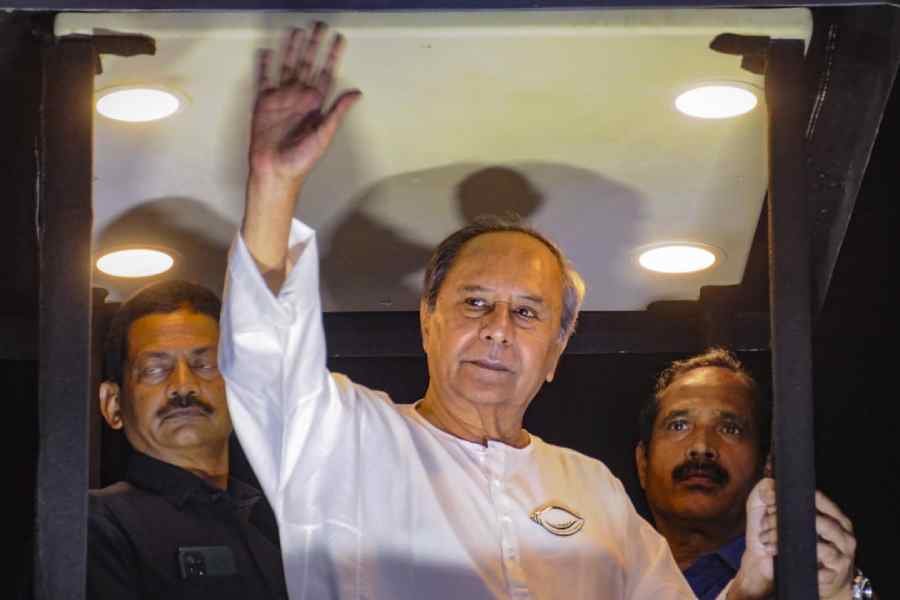The archetypal Brown Saheb who stumbled into politics and Odisha late in life and became Naveenbabu has been given an abrupt sendoff.
Naveen Patnaik, 77, who lost the office he held for 24 unbroken years, must surely rank as one of India’s most enigmatic chief ministers — equidistant from the polarities of Delhi’s power politics, intent on holding his own counsel, often detached and reclusive and yet widely loved, even revered, by Odias.
The last of the aristocrat politicians, Naveen has been receiving a groundswell
of sympathy as he bows out of office.
Social media is flooded with tributes to Naveen, with some describing him as a gentleman politician who brought Odisha to global limelight.
“Time will pass but you will remain in our hearts forever. I miss you Naveen Sir,” a Facebook user wrote.
A rare public outpouring of emotions for a man who had entered politics reluctantly, only to become master of his domain.
Naveen had to be persuaded to join politics after his father and former chief minister Biju Patnaik’s death in 1997 left his Janata Dal unit in Odisha in disarray.
Naveen, a Doon School and St Stephens alumnus, was at the time a jet-setting socialite who counted rock icon Mick Jagger and former US First Lady Jacqueline Kennedy among his friends, and whose contact list included Hollywood celebrities like Robert De Niro.
In an unusual career, Naveen has worn many hats. He played a small role in The Deceivers, a 1988 Hollywood film directed by Nicholas Meyer and starring Pierce Brosnan (who would go on to play James Bond), Shashi Kapoor and Saeed Jaffrey.
He wrote three books — A Second Paradise (on Indian maharajas), A Desert Kingdom (on the Rajputs of Bikaner) and The Garden of Life (on Indian healing herbs) — two of them said to be edited by Jacqueline Kennedy. He ran a boutique, called Psychedelhi, in Delhi where his clients included the Beatles, media reports said.
Journalist and former MP Swapan Dasgupta, a columnist with The Telegraph, wrote a tribute on X, saying: “Naveen Patnaik has lost & his political innings is over. But let us never forget that he was one of the most dignified & courteous political leaders in India....”
Amid the nostalgia about Naveen’s long reign, some tried to analyse his shock defeat. While the BJP was expected to do well in the Lok Sabha elections in the state, few had expected it to win the simultaneous Assembly elections.
While the BJD failed to win even one of the state’s 21 Lok Sabha seats (the BJP won 20 and the Congress, one), its tally in the 147-seat Assembly dropped from 113 to 51. The BJP won 78.
“The BJP cleverly played up the issue of Odia pride. It succeeded in sending out the message that Naveen’s right-hand man, V.K. Pandian, a Tamilian by birth, was going to rule the state,” senior journalist Prafulla Das said.
“Anti-incumbency against most of the BJD MLAs too made things difficult. But Naveen enjoys the love of the people even now.”
Rabi Das, a 75-year-old social activist turned journalist, expressed a different view. “The BJD allowed the BJP to grow in the state at its own cost. People were unhappy with the BJD’s style of functioning,” he said.
“The party had no strong political campaign or political message. Elections are fought on issues and not solely on the strength of the government’s welfare schemes.”
He said the BJD was formed after Biju’s death to articulate and realise the aspirations of Odias. In 1998, it tied up with the BJP but walked out in 2009, accusing the saffron party of inciting anti-Christian violence in Kandhamal.
“Naveen won all the previous elections by articulating the aspirations of Odias. He held a rally in Delhi to highlight demands such as special-category-state status, an increased coal royalty and fair distribution of the Mahanadi’s waters. It convinced the people that the Centre was obstructing the state’s growth,” Rabi Das said.
Das added: “But over the years, the BJD lost its independent identity as a regional party by supporting the BJP-led NDA on every issue, including the Citizenship Amendment Act, the scrapping of Article 370, and the Delhi service bills. It did not go down well with the people. Even the way the BJD twice supported the candidature of (BJP leader) Ashwini Vaishnaw for the Rajya Sabha sent a wrong message.”
Things started turning against the BJD after Pandian joined the party last October, resigning from the IAS. Bureaucrats, politicians and ordinary people resented his “undue interference” in the state administration. He also called the shots within the party.
Rabi Das said things worsened further when the BJD agreed to engage in talks with the BJP to revive their alliance.
“The BJP was able to send out a message that it was the BJD that was eager for an alliance. Following the breakdown of the talks, the BJP sought to project Naveen as Pandian’s hostage…. However, people still have sympathy for Naveen,” he said.
He said the state BJP government would be run in a “corporate mode controlled by Delhi”. Many of the BJD government’s welfare schemes, including the Biju Swasthya Kalyan Yojana, could be done away with, he suggested. “This may trigger a backlash.”
Birupakhya Tripathy, editor of the vernacular newspaper Pragativadi Birupakhya, said: “The Prime Minister was successful in projecting the chief minister as a captive of Pandian who was trying to conceal the leader’s failing health from the people. Modi also played up the issue of the missing keys of the treasure store at the Puri Jagannath temple.”
Samir Dash, a former minister in the Naveen government who joined the BJP after being denied a ticket, said: “The bureaucracy has taken over the political leadership of the party. They failed to read the pulse of the people and there was complete disarray in ticket distribution. Now the BJD is paying the price.”
Attempts to contact BJD leaders did not yield results.










